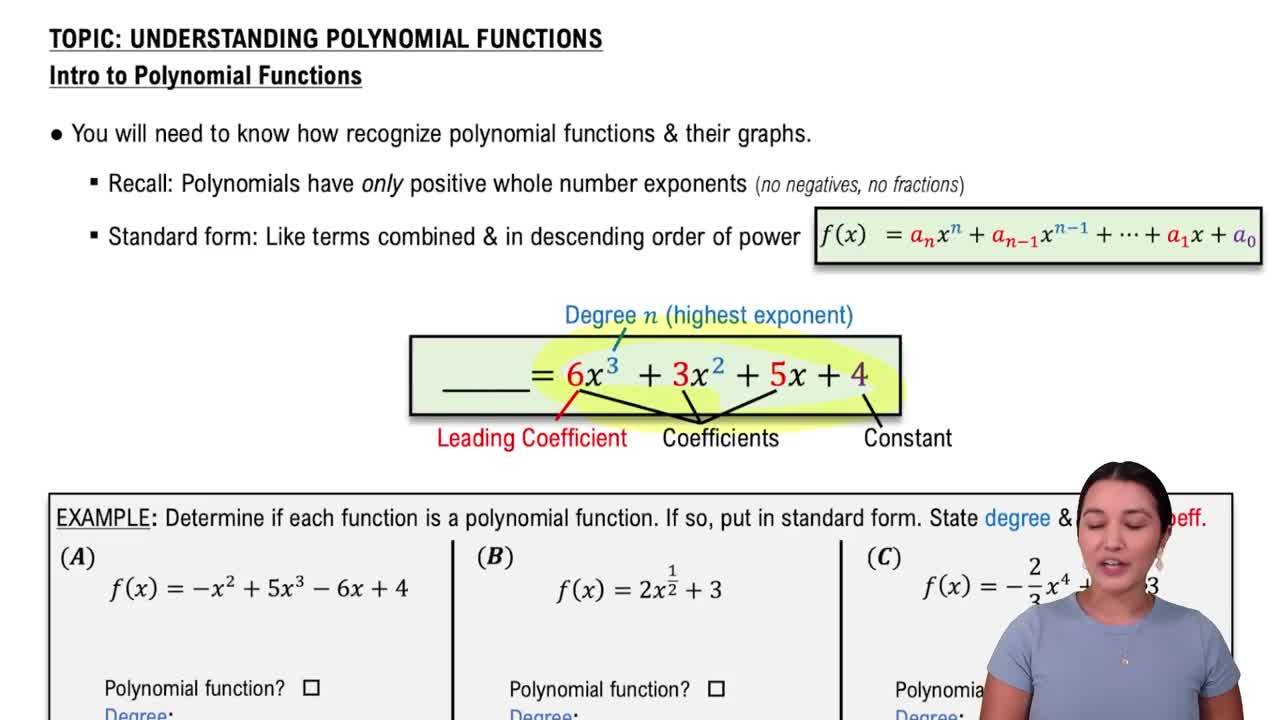Table of contents
- 0. Review of Algebra4h 16m
- 1. Equations & Inequalities3h 18m
- 2. Graphs of Equations43m
- 3. Functions2h 17m
- 4. Polynomial Functions1h 44m
- 5. Rational Functions1h 23m
- 6. Exponential & Logarithmic Functions2h 28m
- 7. Systems of Equations & Matrices4h 6m
- 8. Conic Sections2h 23m
- 9. Sequences, Series, & Induction1h 19m
- 10. Combinatorics & Probability1h 45m
4. Polynomial Functions
Zeros of Polynomial Functions
Problem 61
Textbook Question
Find a polynomial function ƒ(x) of least degree having only real coefficients and zeros as given. Assume multiplicity 1 unless otherwise stated. See Examples 4–6. 5+i and 5-i
 Verified step by step guidance
Verified step by step guidance1
Identify the complex zeros given in the problem, which are 5+i and 5-i.
Recognize that complex zeros occur in conjugate pairs. Since 5+i and 5-i are conjugates, they are both zeros of the polynomial.
Set up factors corresponding to these zeros. For a zero of 5+i, the factor is (x - (5+i)). For a zero of 5-i, the factor is (x - (5-i)).
Multiply these factors to find the polynomial. The multiplication is (x - (5+i))(x - (5-i)).
Expand and simplify the expression obtained in the previous step using the formula (a - b)(a + b) = a^2 - b^2, where a=x-5 and b=i, to find the polynomial of least degree.
Recommended similar problem, with video answer:
 Verified Solution
Verified SolutionThis video solution was recommended by our tutors as helpful for the problem above
Video duration:
6mPlay a video:
Was this helpful?
Key Concepts
Here are the essential concepts you must grasp in order to answer the question correctly.
Polynomial Functions
A polynomial function is a mathematical expression involving a sum of powers in one or more variables multiplied by coefficients. The general form of a polynomial in one variable x is given by f(x) = a_n*x^n + a_(n-1)*x^(n-1) + ... + a_1*x + a_0, where a_n, a_(n-1), ..., a_0 are constants and n is a non-negative integer. Understanding polynomial functions is essential for constructing and analyzing their properties, including their degree and zeros.
Recommended video:

Introduction to Polynomial Functions
Complex Conjugate Root Theorem
The Complex Conjugate Root Theorem states that if a polynomial has real coefficients, then any non-real complex roots must occur in conjugate pairs. For example, if 5+i is a root, then its conjugate 5-i must also be a root. This theorem is crucial for determining all the roots of a polynomial when given complex roots, ensuring that the polynomial remains a function with real coefficients.
Recommended video:

Complex Conjugates
Degree of a Polynomial
The degree of a polynomial is the highest power of the variable in the polynomial expression. It determines the polynomial's behavior, including the number of roots it can have and its end behavior as x approaches positive or negative infinity. In this context, finding a polynomial of least degree means constructing the simplest polynomial that satisfies the given roots, which directly relates to the number of roots and their multiplicities.
Recommended video:
Guided course

Standard Form of Polynomials
Related Videos
Related Practice


